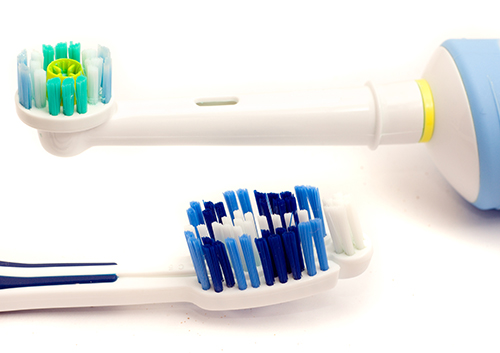Football Season? Practice Dental Defense
September 7th, 2023

It’s finally football season, and whether you’re on the field, at the game, or watching at home with friends, it’s time to work on some defensive dental strategies.
Taking the Field
If you’re playing team football, you already know just how important your mouthguard is. So important, it’s actually part of every uniform. But if your gridiron is the local park or your backyard, you need protection, too! Amateur sports cause a significant percentage of dental injuries every year, and that’s a statistic you don’t want any part of. A store-bought or custom-fitted mouthguard from our Anthem office will help protect your teeth and jaw in case of a fall or collision. If you have a player in braces, a mouthguard is especially important.
In the Stands
Cheering your team on with stadium food in hand is a time-honored game tradition. But some of those options are offensive players. How to hold the line? Cut back on foods that are loaded with sugars and simple carbs, as these are the preferred diet of cavity-causing bacteria. And if the food sticks to your teeth, that gives these bacteria extra time on the clock to produce enamel-damaging acids. Unfortunately, a lot of stadium food falls into these categories. Giant pretzels, soft drinks, chips, caramel corn—sticky, sugary, sticky, sugary, and sticky. But you don’t need to deprive yourself completely. Enjoy in moderation, and hydrate with water to increase saliva (which has many tooth-strengthening qualities) and to wash away food particles.
Home Field Advantage
For most of us, the best seats in the house are right in our living rooms—and our kitchens. Buffalo wings! Chips and salsa! Brats and sauerkraut! However tasty, these snack favorites have something else in common—acidity. Just as the acids produced by bacteria affect our enamel, so do the acids in our foods. Add sugars and simple carbs like sodas, chips, and fries to the party, and you have an enamel blitz attack. There are plenty of dental-healthy snack options available, such as vegetables with hummus dip, or cheese and whole wheat crackers, to add some variety to your menu. If you do eat acidic foods, don’t brush immediately after, since acids weaken tooth enamel, and brushing then can cause enamel erosion. Instead, rinse with water and brush after thirty minutes. You might miss part of the half-time show, but it will be well worth it.
Give some of these tips a try for a winning football season. On the field, at the snack counter, in your TV room, you can enjoy the game a little more by knowing that, when it comes to your dental health, you’re providing complete zone coverage.
September is National Gum Care Month!
September 7th, 2023

Can you believe it's already September? At Daisy Mountain Dentistry, we know that gingivitis, the early stage of periodontal disease, can be difficult to recognize. Many people don’t recognize the warning signs, bleeding and swollen gums, as a precursor to gum disease. This month, a national campaign is under way to raise awareness about gum health and periodontal disease, and we wanted to help do our part to spread the word!
Drs. Peter Vogel, Vijal Vadecha will tell you early recognition and action are the most important steps to health gums, and ultimately a health body, too! Studies are published every year linking oral health, including the gums, to the health of other areas of the body, such as your heart. One of the most important steps to improving the care of your gums is recognizing the warning signs for gum disease. These can include:
- Gums that appear red or swollen
- Gums that feel tender
- Gums that bleed easily (during brushing or flossing)
- Gums that recede or pull away from the teeth
- Persistent halitosis, or bad breath
- Loose teeth
- Any change in the way teeth come together in the biting position
If you happen to notice any of these signs with you or your child, please schedule an appointment at our convenient Anthem office as soon as possible. Drs. Peter Vogel, Vijal Vadecha and our team can take proactive steps to prevent gingivitis and gum disease, while showing you how to improve gum care in your or your child’s daily oral hygiene habits.
Scheduling Dental Procedures When You’re Pregnant
August 30th, 2023

Pregnancy leads to so many changes in your body, so it’s no surprise that your teeth and gums are affected as well! Dental care is very important during these months, so let’s look at some of the concerns you might have about treatments and procedures.
- Regular Exams and Cleaning
Yes and yes! Let us know you are pregnant when you make your appointment. Preventive care is especially important during pregnancy for keeping your gums healthy.
- Periodontal Care
Swollen and tender gums are often one of the first signs of pregnancy. Hormonal changes can make your gums more vulnerable to irritation and infection. Early gum disease, called gingivitis, should be treated promptly to avoid a more serious condition called periodontitis. This form of gum disease can actually cause the gums to pull away from the teeth, leading to pockets where infection can develop. Talk to us about scheduling extra cleanings, if needed, to avoid the plaque build-up that leads to gum disease.
- Regular Dental Work
If you need a cavity filled or a crown placed, talk to us about scheduling. It is important to keep your teeth healthy to avoid infection or more serious dental problems. If you do need restorative work, procedures are usually best treated during the second trimester, where morning sickness is less of a problem and reclining comfortably in the dental chair is easier than it would be in your third trimester.
- Emergency Work
If there is a dental emergency, call us immediately. You shouldn’t put off emergency work, as the complications of pain and infection can be harmful to you and your baby.
- Elective Treatments
If you are thinking about whitening your teeth or having other cosmetic dental work done, waiting until after your baby is born is usually recommended.
- X-rays
Most studies suggest that dental X-rays, because they are so limited in focus, are probably safe during pregnancy. But since there is no definitive answer at this time, it’s recommended to wait until after your baby is born for elective X-rays. In case of a dental emergency, however, an X-ray might be a necessity. If you are worried, talk to us about the shielding we use during X-rays, as well as scientific agreement about the safety of dental X-rays.
Let Drs. Peter Vogel, Vijal Vadecha know about your pregnancy, and we will work with you to schedule exams or treatments at our Anthem office so that your dental experience is both comfortable and safe. If you have any concerns, call us immediately. We know your pregnancy brings many significant changes to your life, but our concern for your health and well-being—that’s unchanging!
Electric or Manual Toothbrush: Why It Does (and Doesn't) Matter
August 30th, 2023

You live in the golden age of toothbrushes. Until a few decades people used twigs or brushes made from animal hair to clean their teeth: not very soft and none too effective.
Now, you have a choice of manual brushes with soft, medium, or hard bristles. Or you might choose to go with an electric toothbrush instead.
Have you ever wondered whether manual or electric brushes provide better cleaning? Actually, they both do the job. The key is to brush and floss every day, regardless of the kind of brush you prefer.
At our Anthem office, we like to say the best brush is the one you'll use. So if you prefer manual, go for it. If you prefer electric, turn it on.
Both types have their advantages but both types will get the job done as far as removing plaque.
Electric Toothbrushes
- Provide power rotation that helps loosen plaque
- Are great for people with limited dexterity due to arthritis or other problems
- Are popular with kids who think the electric brushes are more fun to use
- Can come with variable speeds to help reduce pressure on sensitive teeth and gums
Manual Toothbrushes
- Can help brushers feel they have more control over the brushing process
- Allow brushers to respond to twinges and reduce the pressure applied to sensitive teeth and gums
- Are more convenient for packing when traveling
- Manual brushes are cheaper and easier to replace than the electric versions.
In many ways, the golden age is just beginning. There are already phone apps available to remind you to brush and floss. New apps can play two minutes worth of music while you brush, help you compare the brightness of your smile or help explain dental procedures. Maybe someday we’ll even have programs that examine your teeth after brushing and identify spots you might have missed.


